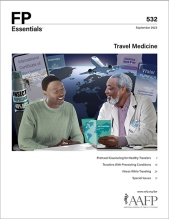
This clinical content conforms to AAFP criteria for CME.
Becoming ill while traveling is an unfortunate but common event, with gastrointestinal, febrile, dermatologic, and respiratory symptoms predominating. However, many illnesses acquired abroad can be prevented or controlled with evidence-based preventive measures and judicious use of appropriate self-care and local medical care. It is important that travelers know how to use international medical care and are aware of available tools to help them identify appropriate medical care in another country. Discussion of evacuation insurance is a crucial part of the pretravel medical evaluation. Epidemiology, prevention, and management guidelines of common travel-related illnesses, such as travelers diarrhea and febrile illnesses, should be addressed. Traveler counseling regarding the early management of serious but underrecognized considerations, such as accident-related trauma, sexual health, and mental health, should be included in the pretravel assessment. Important aspects of appropriate counseling and management of the traveler returning from an extended visit abroad include addressing reverse culture shock and evaluating symptoms that could be part of a delayed presentation of an illness acquired abroad.
Case 3. FS is a 74-year-old patient with stable cardiovascular disease and mild kidney insufficiency, taking five drugs. He is traveling to Uganda for a championship soccer match with JS, his 22-year-old grandson, whose only medical history is a prior knee injury. Neither of them has previously traveled internationally beyond Mexico. They come to your office for pretravel consultations.
Subscribe
From $350- Immediate, unlimited access to FP Essentials content
- 60 CME credits/year
- AAFP app access
- Print delivery available
Edition Access
$44- Immediate, unlimited access to this edition's content
- 5 CME credits
- AAFP app access
- Print delivery available
